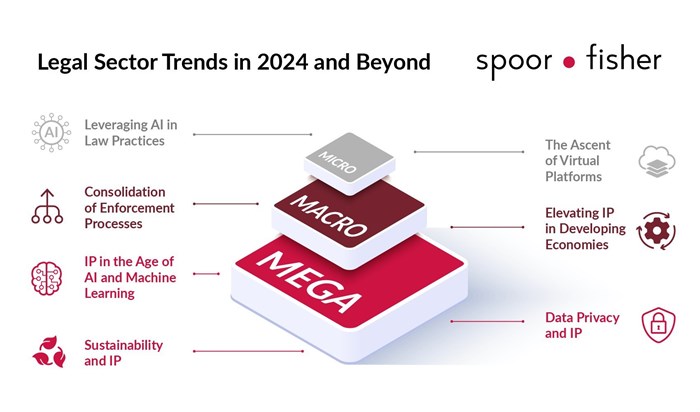
Marketing & Media trends
Industry trends
BizTrends Sponsors
Subscribe & Follow
#BizTrends2024: Shaping the future of IP law in 2024 and beyond

Micro-IP law trends: Fine-tuning IP practice
Leveraging AI in law practices
Automation and artificial intelligence (AI) are no longer discussed in the context of their ability to transform high-tech industries, but are now being routinely implemented in law firms to revolutionise and optimise practices. The rise of automation and AI-driven tools for tasks ranging from patent specification drafting, novelty searching, and trade mark monitoring is a micro-trend with profound implications. In 2024, expect faster processes, improved efficiencies, cost savings, and potentially improved accuracy in data capturing and reporting.
The ascent of virtual platforms
The Covid-19 pandemic accelerated the digital revolution in legal services, a shift that continues to influence IP law. Virtual consultations, electronic filing, and digital dispute resolution have become the new norm. This micro-trend enhances accessibility to IP legal services, making them more convenient and cost-effective.
Macro-IP law trends: Industry-wide shifts
Consolidation of enforcement processes
As businesses expand globally, there's a growing demand for the harmonisation of IP law and the consolidation of IP enforcement processes. This macro-trend involves international bodies and treaties (eg. World Trade Organisation implementing a five-year IP waiver) and collaborations, such as that between the EU member states, enabling the Unitary Patent and the Unified Patent Court. There has been a tendency for countries, which previously acted independently in relation to IP, to consolidate their approaches and streamline processes for dealing with IP. The result? A more consistent and predictable IP environment that spans different jurisdictions, which will continue into 2024 and expand beyond.
Elevating IP in developing economies
Developing economies in Africa and Asia are recognising the vital role of robust IP systems in attracting investment and fostering innovation. This IP law trend is marked by reforms in national IP laws, increased participation in international IP treaties and agreements, and the establishment of more efficient IP offices. It reflects an amplified appreciation for the value of intellectual property in stimulating economic growth and development.

Mega-IP law trends: Transformative global movements
Intellectual property in the age of AI and machine learning
The most profound mega-trend sweeping the globe is the intersection of IP law with AI and machine learning. As AI generates music, art, and literature, and is at the forefront of technology, the traditional concepts of authorship, inventorship and human creativity are undergoing intense scrutiny. In future, fundamental questions will be raised regarding the ownership of IP rights in AI-created works and inventions, which will necessitate an evolution in national IP laws.
Sustainability and IP
The global focus on sustainability is reshaping IP law. The surge in 'green technologies’ and the growing question of the role of IP to address environmental challenges is a mega-trend to watch. This encompasses not only encouraging innovation in sustainable technologies but also the role of IP law to boost the use of these technologies, as opposed to its conventional objective - inhibiting use.
Data privacy and IP
In an era where data is invaluable, the intersection of data rights and privacy takes centre stage. Issues surrounding data ownership, access rights, and the balance between privacy and innovation are at the forefront. This IP law trend has implications for data subjects, businesses that monetise data as well as consumers of this data and society as a whole.
From the practical applications of AI in IP practices to AI-generated content and sustainability, these trends signify a transformative phase in IP law. As we venture into 2024 and beyond, keeping abreast of developments is essential. The landscape is fast-evolving, and so must our strategies for protecting, managing and harnessing the power of IP.

About Dina Biagio
Dina is a Patent attorney with BSc (Physics), BSc (Elec Eng), and LLB degrees. She is an attorney of the High Court of South Africa.Qualified in 2002, Dina has over two decades of experience, primarily in commercial transactions relating to IP, including licensing, manufacturing, supply and distribution, technology transfer and collaboration agreements, IP audits, etc.














